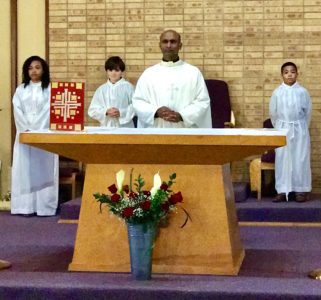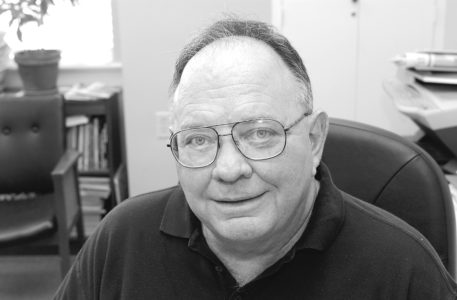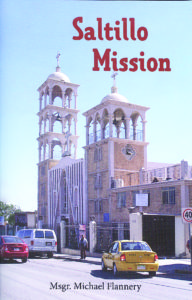Summer Camp a Palooza at St. Joseph
GREENVILLE – St Joseph Catholic Unit School held its annual Summer Camp-a-Palooza in June. Children from the Delta had the opportunity to attend Tennis Camp, Mini-Cheer Camp, Football Camp, Basketball Camp, Baseball Camp and Soccer Camp. “Summer camps offer area children opportunities for fun and learning outside of the classroom. Coaches from each sport teach discipline, pride, self-esteem, determination and love of that particular sport. All in all, 120 Delta area children ages 5-12 attended the various camps last month. We love hosting camps and watching the children grow. We have many year-to-year repeaters and they always leave saying, ‘See ya next year,’” said Missi Blackstock, public relations director for the school. (Photos by Missi Blackstock)
Vacation Bible Schools in Jackson, Natchez, Hernando
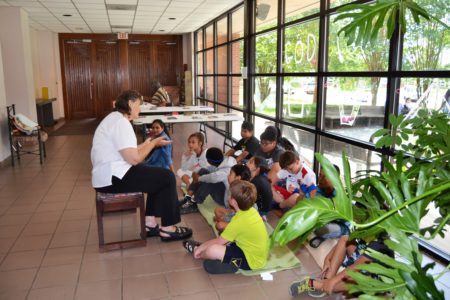
JACKSON – An army of volunteers helped make St Therese Parish Vacation Bible School fun for everyone. Above, Betsy Caraway leads a small group activity. (Photo by Cathy Eaves)
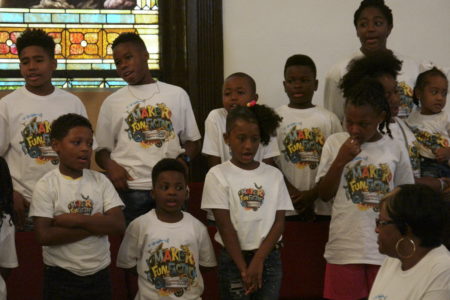
NATCHEZ – Holy Family Parish hosted a Vacation Bible school with the theme Maker Fun Factory in June. Students learned about creation and vocation while they sang, danced and created crafts. At the end of the week, the kids got to meet Bishop Joseph Kopacz, who was in town for a pastoral visit. (Photo by Valencia Hall.)
HERNANDO – Holy Spirit Parish hosted A Mighty Fortress Vacation Bible school during the last week of June. Forty children attended. Adult and teen volunteers helped to guide the children through religious class, music, snacks and crafts. Teachers led a balloon ceremony on the last night in which the children wrote notes to God which they tied to balloons and released into the sky to go to heaven. (Photos by Licritia Holland)
Honoring Our Lady of Fatima

MAGEE – St. Stephen Parish’s First communion class, Robert Talon Michael Hardy, Huynh Minh Dang and Lillian Amelia Ponder, led a procession at the parish in honor of the 100th anniversary of the apparition of Mary at Fatima carrying flowers and candles. The congregation followed praying a decade of the rosary. The procession concluded in the Parish Hall where the statue of Our Lady of Fatima was placed on a special alter and the parish prayed a prayer of consecration to Jesus through Mary. (Photo courtesy of Kelleigh Wilson)
Graduation honors for Holy Family
NATCHEZ – Holy Family Early Learning Center graduates process out of Mass in their honor showing off their certificates in May. The center continues to educate young people from pre-k through kindergarten. (Photo by Valencia Hall)
Winona youth locked in
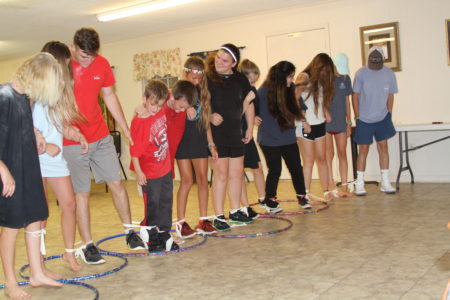
WINONA – Sacred Heart youth in Winona participated in a team builder called “Airlocking” after geocaching and two competive games of capture the flag at their summer kick-off lock-in “The sleepless sleepover” held in the family life center. The youth continue summer fun sessions with plans to attend Geyser Falls and the escape room in Jackson. (Photo by Tara Trost)

